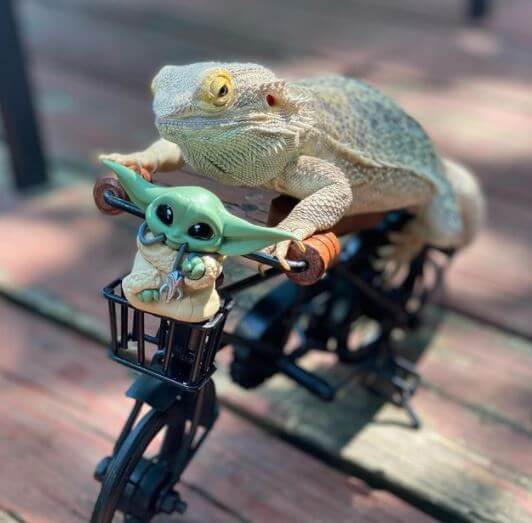Lately, I have been receiving many questions like, “Why does my bearded dragon run away from me?”
Unlike typical pets such as dogs and cats, bearded dragons’ behaviors are much harder to understand or pick up.
For instance, when a cat runs away from you, you know she wants to be alone, or she is finding her mates.
However, when it comes to a beardie, the reasons might range from his behaviors or the sudden change from the environment. All of that is a considerable risk to his life and the bonding between you and him.
Fortunately, after profound tests and research, I realize some key culprits leading the escape behaviors. While some are pretty normal, some need your immediate intervention.
Related Posts:
- Can Bearded Dragons Eat Squash?
- Reasons Why Your Bearded Dragon Turned White and Died
- How Often to Trim Bearded Dragon Nails? A Detailed Guide
- Can You Use a Fish Aquarium for a Bearded Dragon?
- Fancy Bearded Dragon vs. Bearded Dragon: Which One Is the Best?
Why Does a Bearded Dragon Run Away From His Owner?
Why does your bearded dragon run away from you?
Often, your bearded dragons escape from you because he is scared or startled. A wrong approach or way of picking up also reinforces his fear and instinct defense. Other than that, the abnormal temperature in the environment also makes him want to run.
If your beardie is still young and always escapes from your handling, he may not have gotten used to it with his new owner.
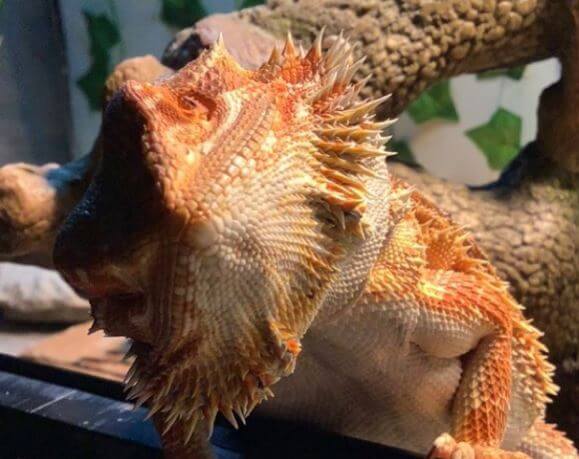
1. An Inaccurate Approaching
For the most reason, a beardie feels fearful when any approaches him from behind or above. That phenomenon has its roots in the natural defense mechanism.
Bearded dragons feature a third eye on their head, which is not for watching. That specific part is to sense or recognize the changes in shape and temperature.
In the natural environment, bearded dragons are both a predator and prey.
Significantly, they are often the delicious meals of birds. To protect themselves, whenever a strange feature comes down near their heads, they would hide.
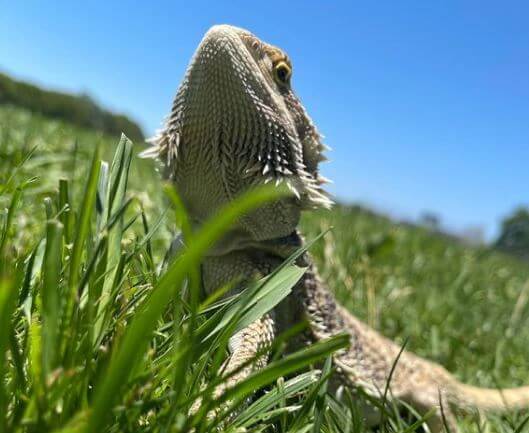
Inexperienced owners do not understand the self-protection way. So, they feed or pick up their beardies in the wrong way.
Concerning the picking-up method, I would like to emphasize how you keep him in your hand. That means you have to move your hands under the beardie’s body first. And remember to support his whole body.
If not, when you handle imprecisely, such as dangling him, he would be scared of you all the time.
The quiet animal would not tell you or scream in your face when you do the action. Unlike noisy dogs or crying kids, he escapes whenever he sees you after a few times you cuddle him wrongly.
The negative communication forces the small animals to keep hiding.
2. A Fearful Emotion
Another reason why a bearded dragon runs away is that he feels threatened. When it is the first time he sees such a colossal creature coming near, his instinct is to run. Think about when you meet a tiger or an elephant.
What is your first response? Of course, you would run as fast as you can.
The same is the beardie’s behavior.
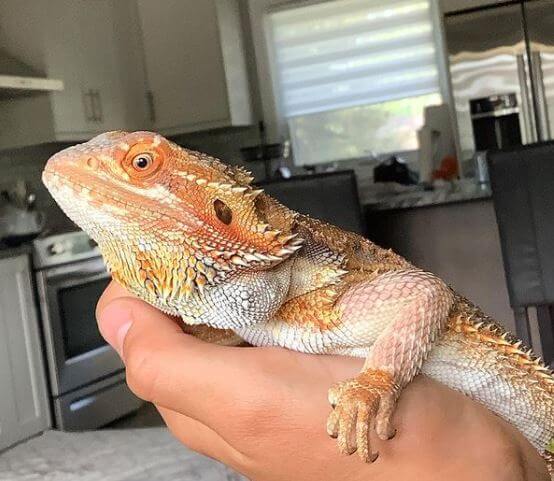
Besides, the reptile might become stressed out for some other reasons like sudden high-pitch sounds, being hungry, or an unusual heat.
Occasionally, he might be frustrated with other pets running around his enclosure, or he wants to find a mate.
You should find out the exact reasons before keeping moving to his hide place and bonding.
3. An Abnormal Temperature in the Shelter
The third cause is the abnormal condition in the tank. A beardie is a cold-blooded animal, so his body depends on the outside environment’s temperature.
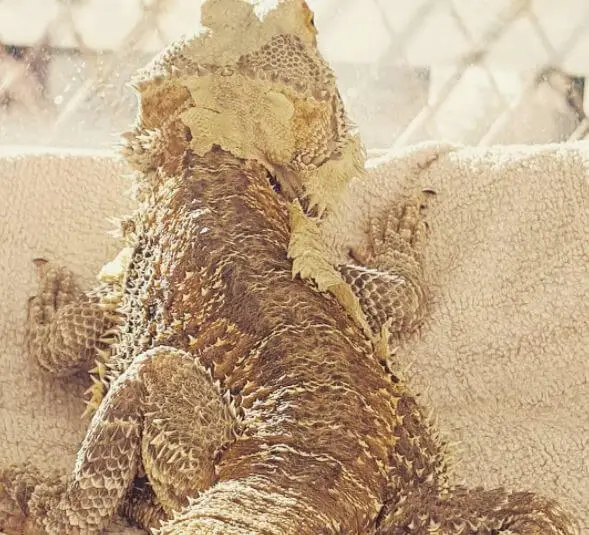
As a result, when the heat is suddenly off, he would fall into bouts of lethargy or over-active. For some, you even see your bearded dragon running up the glass.
To discover if this is a possible reason, check the temperature in the pet’s shelter and the basking setup. When you already adjust the condition to the proper heat, but the reptile still shows weird actions like escaping, take him to the herp veterinarian right away.
4. He Is Not Used to Being With You
The last explanation might be that the young or new beardie is not familiar with you. If that is true, there is no need to worry.
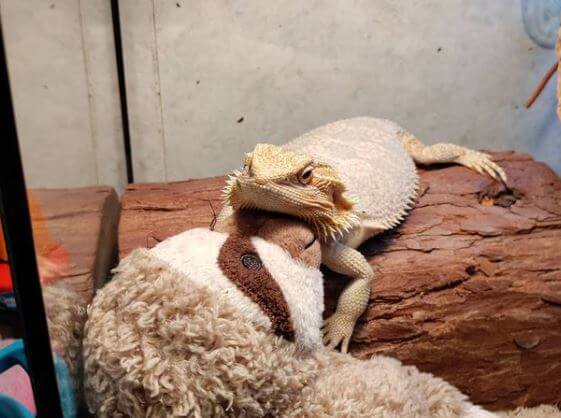
Some juveniles are easily scared of the outside threat, like a creature in your size. He might wonder how to handle you. And, just after a few seconds, his instinct tells him to run.
To tackle the problem, try to bond with him, and he would be getting used to the new friend over time.
How to Stop a Bearded Dragon From Running Away From His Owner?
To solve the problems, you can not expect to keep chasing the beardie quickly. Not only does the solution scare the animal, but you might also waste your time and energy. Just follow some suggestions below, and you can fix the behavior soon.
1. Handle Accurately
The first helpful solution to keep your beardie stay calm is to pick them up accurately and slowly. From the front of the beardie, leisurely put your hand under his belly.
While handling him, use both your hands to support his body. When you want to let him down, put your hand flat on the ground and gently lower the wrist to slide him off.
Let’s take a look at this video to know about tips and tricks to handle a beardie accurately:
2. Remove His Fears
If stress is the culprit for your bearded dragon’s behavior, I recommended you remove his aggression by taking away the stressors, bathing him, or using a dark blanket to cover his tank.
Furthermore, feeding him might be helpful. Overall, give him food a few times to balance his emotion.
3. Make Him Comfortable Again
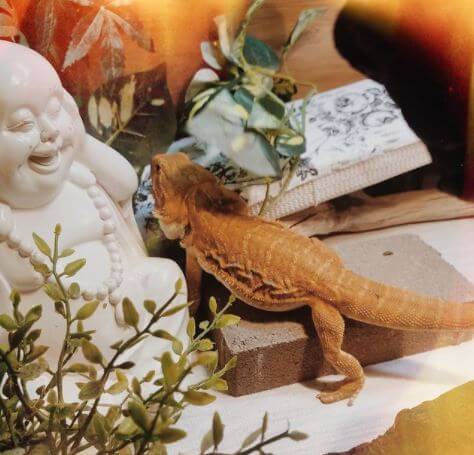
If the outside temperature is the cause, make sure to adjust the heat to the standard degree.
In the expected condition, bearded dragons’ heat typically ranges from 33°C to 36°C. However, if your beardie wants to bask, the ideal temperature should be between 38°C to 42°C. In his enclosure, the required temperature for hiding is around 27°C, and 18°C is the heat at night.
Plus, it would help if you used a UV bulb in his shelter. When you give him food, remember to put your hand far from his position and slowly approach the animal. Ideally, using a bowl with a cover above would help.
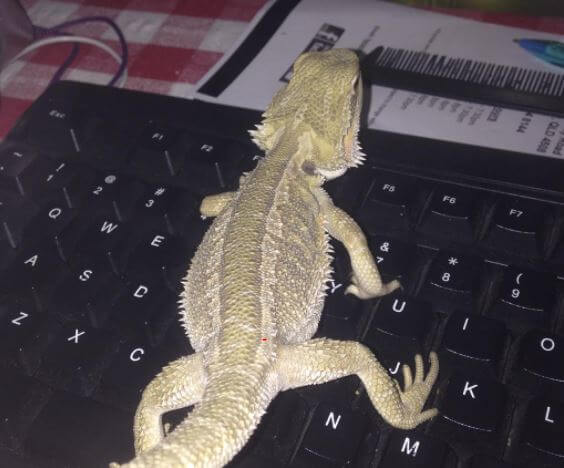
Frequently Asked Questions About Bearded Dragons Running Away
1. How Long Does It Take for Bearded Dragons to Get Used to You?
In a comfortable environment when the temperature, humidity, and light are medium, the new beardie needs two to three days to get used to his owner.
However, if you do not take care of them correctly or set up the shelter wrong, the relocation time might last weeks. To the worse, he might escape from the strange area if he does not feel comfortable over time.
2. Why Do My Bearded Dragons Not Like Me?
A new beardie often feels threatened by such strange and giant creatures as you, especially when your hands approach him the wrong way.
He perceives them to be a danger. That’s when he bites you or makes hiss sounds. Once you stay away from the actions, he could keep doing that until you can earn his trust.
3. Why Does My Bearded Dragon Run Into Walls?
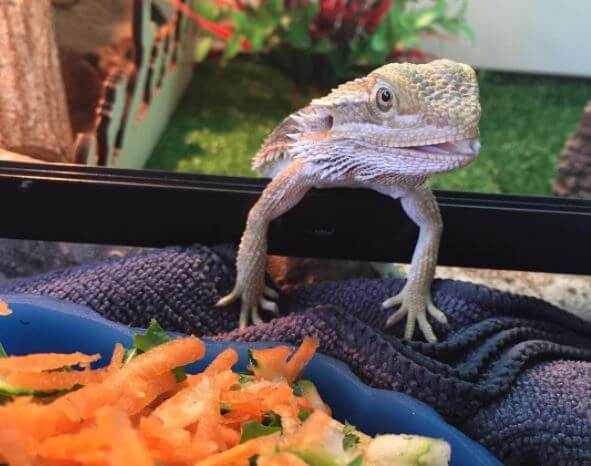
A beardie is scratching the walls primarily because of his fear. There might be other more giant animals like a dog, a cat, or another beardie trying to annoy him.
Typically, the reptile can smell relatively well and realize which animal is nearby. Driven by his instinct, he would immediately run to a more extended position than the walls.
4. How to Calm Down My Bearded Dragons?
There are two fundamental methods you can do to get a beardie to calm down.
With the female, you can try to stroke her once you hold her in your hand. With the male, please focus on the careful way you pick him up and let him down.
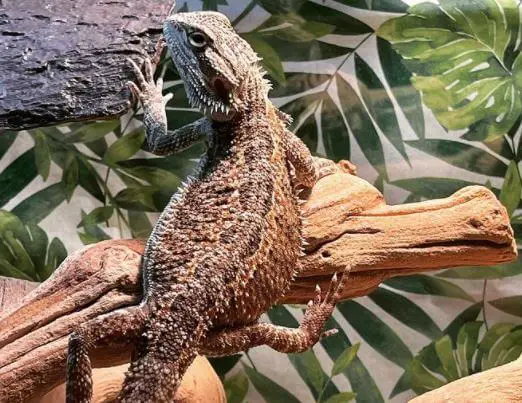
For instance, when you get him out of your hand, keep in mind to put your thumb far away from his mouth and raise your wrist slightly.
5. How Fast Do Bearded Dragons Run?
Beardies can run up to nine miles per hour when they recognize a threat.
Before running, they usually stand on their hind legs. Although they are not the fastest runner in the wild, their speed is relatively high compared to other reptiles.
Conclusion
I have shared a little bit of knowledge about the question, “Why does my bearded dragon run away from me?”
In a nutshell, that kind of dragon might be scared, and he has not been used to it with you. Other than that, the environment’s temperature may be too low, or you approach him in the wrong way.
I hope you can come near and bond with him soon.
Key take away points for why your bearded dragon may be running away from you:
If your bearded dragon seems to run away from you or displays avoidance behavior, it can be puzzling. However, several reasons may explain this behavior:
1. Natural Instinct:
- Bearded dragons have a natural instinct to seek shelter or hide when they perceive a potential threat. Running away is a survival strategy.
2. Size and Dominance:
- Bearded dragons may feel intimidated or threatened by larger objects, including human hands and bodies, causing them to run away.
3. Sudden Movements:
- Rapid or unpredictable movements can startle bearded dragons and prompt them to flee.
4. Unfamiliarity:
- Bearded dragons might run away if they are not used to your presence, especially if they have not been adequately socialized.
5. Stress:
- Stressors like loud noises, bright lights, or frequent handling can lead to avoidance behavior.
6. Inadequate Socialization:
- Bearded dragons that have not been properly socialized from a young age may be more inclined to avoid interaction with humans.
7. Handling Errors:
- Improper or forceful handling can lead to fear and avoidance. Be gentle and patient during handling to build trust.
8. Temperature Discomfort:
- If the temperature is too hot or too cold, bearded dragons may become restless and run to seek a more comfortable spot.
9. Territorial Behavior:
- In some cases, bearded dragons may feel territorial and exhibit avoidance when they believe their space is being encroached upon.
10. Hunger or Thirst: – If your bearded dragon is hungry or thirsty, they may run away from you to search for food or water.
11. Illness or Pain: – Discomfort or illness can cause avoidance behavior. If your dragon seems lethargic or unwell, consult a veterinarian.
12. Environmental Factors: – An unsuitable or overcrowded enclosure can lead to stress and avoidance behavior.
13. Recent Changes: – Any significant changes in the environment, such as a new enclosure or rearrangement, can cause temporary avoidance until your dragon adjusts.
14. Time of Day: – Bearded dragons are more active during the day, so they may run away if you approach them during their resting period.
15. Individual Personality: – Each bearded dragon has a unique personality, and some may be more inclined to run or be timid, while others may be more social.
16. Slow and Patient Approach: – Approach your bearded dragon slowly and calmly. Gradually build trust through gentle interactions and positive reinforcement.
17. Proper Handling Techniques: – When handling your dragon, support their body and avoid sudden movements to make them feel secure.
18. Environmental Considerations: – Ensure your dragon’s enclosure is appropriately set up with the right temperatures, UVB lighting, and hiding spots.
19. Regular Socialization: – Spend quality time with your bearded dragon to foster a strong bond and reduce avoidance behavior.
20. Consult a Herpetologist or Veterinarian: – If you are concerned about your bearded dragon’s behavior, it’s advisable to seek guidance from a herpetologist or reptile veterinarian.
In summary, there are several reasons why your bearded dragon might run away or display avoidance behavior. Understanding these factors and taking appropriate steps to address them can help you build a trusting relationship with your pet and reduce their tendency to run away from you
Further Reading:
- Carolina Custom Cages Terrarium Review
- 8 Best Basking Rocks for Beardie: What Is the Best Choice?
- 10 Best Thermometers for Beardie: How to Choose the Best One?
- 5 Best Beardie Lighting Setups for Beardie Lovers
- 9 Best Heat Lamps for Beardie: Natural Habitat Provided

